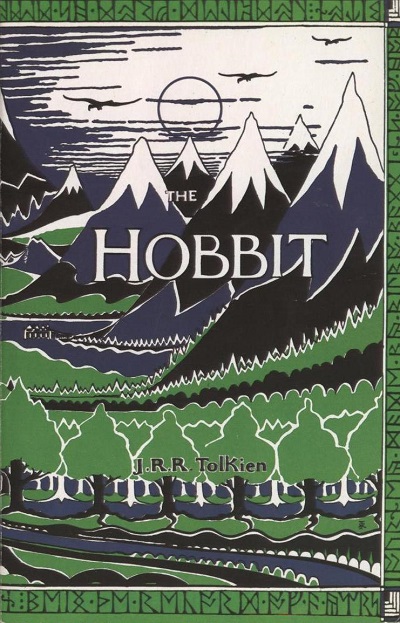april book⤴

The Hobbit by J. R. R. Tolkien
adventure · fantasy · battle | 300 pages
“A glorious account of a magnificent adventure, filled with suspense and seasoned with a quiet humor that is irresistible... All those, young or old, who love a fine adventurous tale, beautifully told, will take The Hobbit to their hearts.”—The New York Times Book Review
Bilbo Baggins is a hobbit who enjoys a comfortable, unambitious life, rarely traveling any farther than his pantry or cellar. But his contentment is disturbed when the wizard Gandalf and a company of dwarves arrive on his doorstep one day to whisk him away on an adventure. They have launched a plot to raid the treasure hoard guarded by Smaug the Magnificent, a large and very dangerous dragon. Bilbo reluctantly joins their quest, unaware that on his journey to the Lonely Mountain he will encounter both a magic ring and a frightening creature known as Gollum.
discussion
club meeting date: Thursday, April 28 @ 7:30pm
discussion questions (spoilers):
- Why do you think that Gandalf picked Bilbo to go on the quest with the dwarves, if hobbits typically dislike adventure?
- Tolkien intended The Hobbit to be read by both children and adults. Do you think that it's suited for one age group more than another? What do you think appeals to each group?
- What factors define a person’s identity in The Hobbit? Do individuals have any power over who they become, or are their characters entirely determined by static factors such as family and race?
- What is the role of wealth in The Hobbit? The characters have varying attitudes toward property and material goods. Whose viewpoint does the novel seem to endorse, if any?
- Throughout the book, Tolkien uses a number of poems and songs to add to the mood of the novel. What purpose do they serve in the story? Do you think the poems and songs are effective? (Here's Tolkien singing "Chip The Glasses And Crack The Plates" from Chapter One.)
- Just before Bilbo escapes from the tunnel which leads to an exit from the Misty Mountains, he must get past Gollum, who is blocking the way. At first, Bilbo was tempted to injure or kill Gollum, but he changed his mind. Tolkien comments as follows: "A sudden understanding, a pity mixed with horror welled up in Bilbo's heart: a glimpse of endless unmarked days without light or hope of betterment, hard stone, cold fish, sneaking and whispering. All these thoughts passed in a flash of a second." Later, in the Lord of the Rings, Gandalf tells Bilbo's nephew Frodo that Bilbo's pity for Gollum was the primary thing preventing the ring gaining a hold over Bilbo. Why is pity such an important concept in The Hobbit and The Lord of the Rings? How did Bilbo's action affect the trajectory of the story? Why did Bilbo act as he did toward Gollum, when it was clear that Gollum would not act this way toward Bilbo?
- Given his development throughout the book, does Bilbo belong in Hobbiton at the end of the novel? Is he a completely different person at the end of the novel, or has he only changed in some respects? How do you think Tolkien views the relationship between heroism and the simple life?
- Most of us have been exposed to The Lord of the Rings through at least the movies. Did you find that your foreknowledge colored how you interpreted the events in this book? Do you think The Hobbit stands alone as a novel, or function better as a prequel to LoTR?
questions adapted from the Fremont Public Library and The Word Nerds Book Club
member reviews
email your reviews to alicia@thedigitaldiarist.ca
nancy

⨳⨳⨳
⨳⨳⨳
alicia
I have a fondness for Tolkien's style of narration. The storybook charm of it was immediately appealing. He understands completely the world he's created, and presents it matter-of-factly.
The dwarves tend to blur in my mind as one large group, without much opportunity for individual personalities to shine through. The only character I get a good sense of is Bilbo, and I love that strange little Hobbit. He's so very English, bound by politeness and a sense of duty, and a reluctant adventurer. I admit I have a suspicion of people too eager for adventure—I'm rather Hobbit-like myself.
My favourite quote is what Gandalf says at the very end of the adventure, after Bilbo remarks that the prophecies of the old songs have come true: "And why should not they prove true? Surely you don't disbelieve the prophecies, because you had a hand in bringing them about yourself? You don't really suppose, do you, that all your adventures and escapes were managed by mere luck, just for your sole benefit? You are a very fine person, Mr. Baggins, and I am very fond of you; but you are only quite a little fellow in a wide world after all!" To which Bilbo laughs and replies, "Thank goodness!"
And I think that's the truth at the heart of The Hobbit. This story is not driven by our characters; it is driven by the unknowable forces that shape the universe (and nudged along by meddling wizards). Which is why I think the plot is not very satisfying to a modern reader. You have to enjoy the adventure merely for what is it, and if you are not interested in the trolls or dragons or riddles, you aren't given much reason to care about these characters or their quest. For my part, I enjoyed the adventure.
And I can't help but think of the Baker's Wife in Into the Woods singing, "Just remembering you've had an "and" / When you're back to "or" / Makes the "or" mean more / Than it did before..." This was Bilbo's moment in the woods.